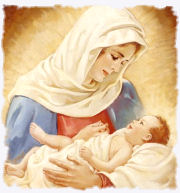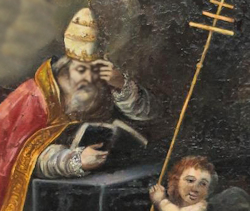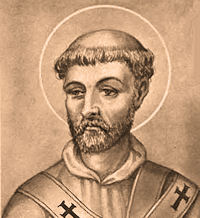Christmas: January 11th
Saturday of Christmas Time after Epiphany
Other Commemorations: St. Hyginus, Pope and Martyr (RM); St. Theodosius, Abbot (RM)
» Enjoy our Liturgical Seasons series of e-books!
We come to the end of the Christmas season. Tomorrow's Feast of the Baptism of the Lord is the last day of the Christmas season. With the Church we continue our post-Epiphany thoughts.
Today the Roman Martyrology commemorates Pope St. Hyginus (d. 142). During the four years of his pontificate (138-142), he had to oppose the heresy of Valentinus who at this period came to propagate his errors in the heart of the Christian community in Rome.
St. Theodosius, Abbot or Cenobiarch (423-529), is also commemorated in today's Roman Martyrology. He was born in Cappadocia in the village of Magarisso, who after having endured great sufferings for the Catholic faith, took his rest in peace at the monastery which he had erected on a lonely hill in the diocese of Jerusalem.
Christmas Weekday—Day Eighteen In Mexico El Día de Los Tres Reyes (Day of the Three Kings) celebrates the arrival of Gaspar, Melchior, and Balthazar at the place of Jesus' birth.
In Mexico El Día de Los Tres Reyes (Day of the Three Kings) celebrates the arrival of Gaspar, Melchior, and Balthazar at the place of Jesus' birth.
The day is also known as El Día de Los Reyes Magos (Magi) in Spanish and Epiphany in English commemorates the divinity of Christ as manifested to the Magi, the kings who brought him gifts. We already celebrated the actual Solemnity of Epiphany, but we are exploring different traditions related to this feast.
On the night before El Día de Los Reyes, the children fill their shoes with hay and leave them outside. It is believed that the Wise Men will stop at each home to feed their horses, leaving gifts in exchange for hay.
Finally, El Día de Los Reyes arrives, and the whole family wakes up to open the gifts left by the Three Kings. However, this is only the beginning. On that day, family and friends gather, while the children keep busy playing with their new toys.
The adults continue with the day's activities by preparing a big dinner and serving a very special dessert, a bread known as La Rosca de Reyes or Three Kings Bread. —by Frances Chaparro, Estela Muñoz and Adrian Zamilpa
- Day Eighteen activity (Los Posadas)
- Day Eighteen recipe (La Rosca de Reyes)
Epiphany Reflection: Blessed Transformation
1. "Let all the earth adore Thee, O God, and sing to Thee" (Introit). We praise Thee because Thou dost celebrate daily Thy epiphany in our midst in the Sacrifice of the Mass, because in the miracle of the consecration, Thou dost transform bread and wine into Thy body and blood, and because Thou dost give them to us in Holy Communion. "May the operation of Thy power be increased within us, we beseech Thee, O Lord, that being quickened by Thy divine sacraments, we may by Thy bounty be prepared to receive what they promise."
2. What takes place in reality at Mass is symbolic of what happens when we take off the old man and put on the new. We change from sinful, earthly, passionate, imperfect creatures to sons of God, living a divine and holy life. Thus we may understand the Epistle and the story of the miracle at Cana. If we assist devoutly at Mass today and receive Communion fruitfully, we shall return home as new men. Then we will live a life such as that outlined for us by St. Paul. We shall hate what is evil and cleave to what is good. We shall love one another with the charity of brother-hood, and anticipate one another in honor. Avoiding all sloth, we shall be fervent in spirit and serve the Lord. We shall rejoice in hope, be patient in tribulation, and instant in prayer. We shall contribute to the necessities of the saints (our fellow Christians), and pursue hospitality. With them that rejoice we shall rejoice, with them that weep we shall weep. We shall turn from high things and consent to that which is humble.
The change that takes place in the Mass must find a parallel in our own lives if we are to be properly prepared for the coming of Christ in His majesty on the last day. On that day He will appear before the whole world in majesty and power. At His final coming the final transformation will take place. "And as in Adam all die, so also in Christ all shall be made alive....So also is the resurrection of the dead. It is sown in corruption, it shall rise in incorruption. It is sown in dishonor; it shall rise in glory. It is sown in weakness; it shall rise in power. It is sown in a natural body; it shall rise a spiritual body....For this corruptible must put on incorruption; and this mortal must put on immortality" (I Cor. 15:22, 42, 41, 53). Christ "will reform the body of our lowness, made like to the body of His glory, according to the operation whereby also He is able to subdue all things unto Himself" (Phil. 3:21). With the same ease with which He performs the miracle of Cana and the daily miracle of the Mass, He will one day transform our bodies so that we may share His eternal glory. Rejoice in hope; God "hath regenerated us unto a lively hope, by the resurrection of Jesus Christ from the dead" (I Pet. 1:3). "So also you now indeed have sorrow. But I will see you again and your heart shall rejoice; and your joy no man shall take from you" (John 16:22). "And I dispose to you, as My Father hath disposed to Me, a kingdom" (Luke 22:29). "Be glad and rejoice, for your reward is very great in heaven" (Matt. 5: 12).
3. What now is, will pass. God will renew all things. "He who soweth sparingly shall also reap sparingly, and he who soweth in blessings shall also reap blessings" (Il Cor. 9:6). "Now the God of hope fill you with all joy and peace in believing, that you may abound in hope and in the power of the Holy Ghost" (Rom. 15:13).
—Excerpted from The Light of the World, Volume One by Benedict Baur, O.S.B.
St. Hyginus
 The crown of the empire belonged to Antonius Pius. Hyginus, as Telesphorus' successor, not only had to endure his relentless persecutions but also had to cope with the heretics who made their way to Rome.
The crown of the empire belonged to Antonius Pius. Hyginus, as Telesphorus' successor, not only had to endure his relentless persecutions but also had to cope with the heretics who made their way to Rome.
Hyginus was a Greek from Athens who, like his contemporary Justin Martyr, was a philosopher. He is said to have done some organizing of the clergy, and it is likely that he addressed the Roman clergy on the subjects of sin in general and of obedience to the Church.
The emergence of Gnosticism is probably the most significant development of Hyginus' pontificate. Cerdo came from Syria and Valentinus from Egypt, and together they taught this system of mystical belief, which was a combination of Greek philosophy and Oriental superstitions regarding Christ. For years Cerdo vacillated between teaching error and repenting, returning to the Church, then falling from grace. Valentinus, however, staunchly defended his cause. Hyginus perceived this as heresy, for it deviated greatly from the true teachings of the Apostles.
Hyginus was said to have suffered gloriously and he was buried on Vatican Hill.
Symbols and Representation: abbot hermit with iron bands on his neck and arms, chains and a money bag near him
Patronage: file makers
Highlights and Things to Do:
- Read more about Pope St. Hyginus:
- What is Gnosticism? Read this in depth article at New Advent to find out. For a synopsis of this heresy, see Catholic Answers.
- Even though he only reigned for 4 years, Hyginus instituted godparents at baptism, and decreed for the consecration of churches.
St. Theodosius
 St. Theodosius was so inspired by Abraham's example of leaving his loved ones and homeland for God that he left his homeland of Cappadocia to make a pilgrimage to Jerusalem. There St. Theodosius took as his guide the holy man Longinus, who placed him in charge of a church near Bethlehem. Theodosius did not stay there long, however, but he went to live in a cave on a nearby mountain. He was known for his holiness, and many desired to dedicate their lives to God as monks under Theodosius. He built a monastery at Cathismus, as well as three hospices: for the sick, the elderly and the mentally ill. When Emperor Anastasius was persecuting Christians who did not accept the Eutychian heresy, which states that Christ has only one nature, St. Theodosius preached orthodoxy throughout Palestine, even stating from the pulpit in Jerusalem: "If anyone receives not the four general councils as the four gospels, let him be anathema." The Saint renewed the courage of those in whom the Emperor's edicts had instilled fear. Anastasius banished Theodosius, though he was later recalled by Anastasius' successor. Theodosius died at the age of 105; many miracles occurred at his funeral.
St. Theodosius was so inspired by Abraham's example of leaving his loved ones and homeland for God that he left his homeland of Cappadocia to make a pilgrimage to Jerusalem. There St. Theodosius took as his guide the holy man Longinus, who placed him in charge of a church near Bethlehem. Theodosius did not stay there long, however, but he went to live in a cave on a nearby mountain. He was known for his holiness, and many desired to dedicate their lives to God as monks under Theodosius. He built a monastery at Cathismus, as well as three hospices: for the sick, the elderly and the mentally ill. When Emperor Anastasius was persecuting Christians who did not accept the Eutychian heresy, which states that Christ has only one nature, St. Theodosius preached orthodoxy throughout Palestine, even stating from the pulpit in Jerusalem: "If anyone receives not the four general councils as the four gospels, let him be anathema." The Saint renewed the courage of those in whom the Emperor's edicts had instilled fear. Anastasius banished Theodosius, though he was later recalled by Anastasius' successor. Theodosius died at the age of 105; many miracles occurred at his funeral.
—Excerpted from Saints Calendar and Daily Planner, Tan Books
>p>Symbols and Representation: abbot hermit with iron bands on his neck and arms, chains and a money bag near him
Patronage: file makers
Highlights and Things to Do:
- Read more about St. Theodosius:
- See in the Holy Land where Theodosius lived.
- St. Theodosius staunchly opposed Monophysitism for which the Emperor Anastasius temporarily exiled him. Read more from the Catholic Encyclopedia.






